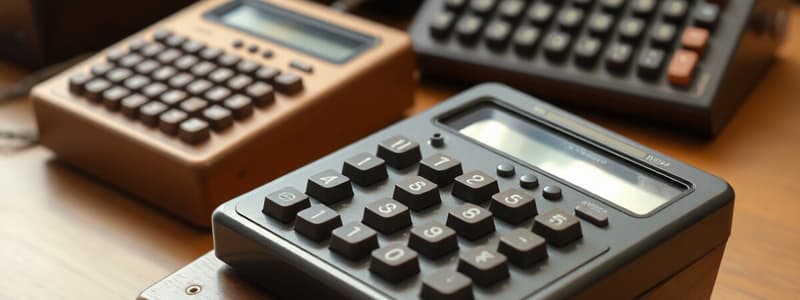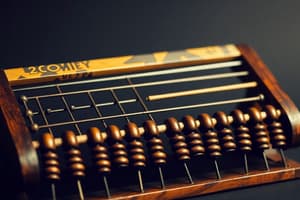Podcast
Questions and Answers
What was the primary purpose of the abacus when it was invented?
What was the primary purpose of the abacus when it was invented?
- To visualize mathematical calculations (correct)
- To store data
- To perform complex programming
- To automate processes
Who invented the first mechanical calculator and what was its purpose?
Who invented the first mechanical calculator and what was its purpose?
- Blaise Pascal; to assist his father's tax calculations (correct)
- Alan Turing; to decode messages
- Ada Lovelace; to write computer programs
- Charles Babbage; to perform complex calculations for scientists
Which component was NOT part of Charles Babbage's calculating engine?
Which component was NOT part of Charles Babbage's calculating engine?
- Processor
- Input
- Output
- Monitor (correct)
How did the term 'computer' evolve over time?
How did the term 'computer' evolve over time?
What major technology replaced the numerous moving parts in calculating machines?
What major technology replaced the numerous moving parts in calculating machines?
Who is recognized as the first computer programmer?
Who is recognized as the first computer programmer?
Which statement accurately describes early 20th-century computers?
Which statement accurately describes early 20th-century computers?
What advancement allowed for computers to become smaller and more efficient?
What advancement allowed for computers to become smaller and more efficient?
Which of the following was a significant feature of Charles Babbage's machine?
Which of the following was a significant feature of Charles Babbage's machine?
What is one way in which Ada Lovelace contributed to computing?
What is one way in which Ada Lovelace contributed to computing?
Flashcards
Abacus
Abacus
A tool used for performing calculations by moving beads on a rack.
Mechanical Calculator
Mechanical Calculator
A machine that uses moving parts, like gears, to perform calculations.
Calculation Engine
Calculation Engine
A calculating machine devised by Charles Babbage, that laid the foundation for modern computers.
Digitization
Digitization
Signup and view all the flashcards
Computer Programmer
Computer Programmer
Signup and view all the flashcards
Early Computers
Early Computers
Signup and view all the flashcards
Computer Evolution
Computer Evolution
Signup and view all the flashcards
Computer Components
Computer Components
Signup and view all the flashcards
Necessity is the Mother of Invention
Necessity is the Mother of Invention
Signup and view all the flashcards
Changing Definition of Computer
Changing Definition of Computer
Signup and view all the flashcards
Study Notes
Early Calculating Tools
- The abacus, a wooden rack with beads, was used for calculations like addition and subtraction.
- It's still used today.
- The abacus demonstrated a need for more sophisticated calculating tools.
Mechanical Calculators (17th Century)
- Blaise Pascal created a mechanical calculator using gears for addition and subtraction, the first such machine.
- This fulfilled the need for automated calculation.
- The term 'computer' originally referred to a human who performed computations.
Calculating Engines (19th Century)
- Charles Babbage designed the calculating engine, a complex device with input, processor, memory, and output.
- These four components remain fundamental in all modern computers.
- The engine's development led to the concept of "digital" computation – replacing mechanical parts with switches.
Early Computers and Programming
- Ada Lovelace is considered the first computer programmer.
- She developed sequences for non-existent computers.
- Lovelace predicted the digitization of sound, music, text, and pictures.
20th-21st Century Computer Evolution
- Early computers were large, room-filling devices requiring teams to operate.
- Their size, speed, and cost decreased over time, becoming widely available.
- Personal computers (PCs) became widely accessible in homes during the 21st century.
- Software development simplified computer use and expanded possibilities.
Modern Computer Capabilities
- Modern computers perform far beyond basic calculations.
- They support gaming, navigation, home control, photography, and digital reading.
- The evolution of simple tools like the abacus to modern, sophisticated computers fulfills a crucial human need for information processing and automation.
Studying That Suits You
Use AI to generate personalized quizzes and flashcards to suit your learning preferences.




